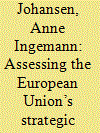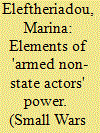| Srl | Item |
| 1 |
ID:
155693


|
|
|
|
|
| Summary/Abstract |
This article argues that the European Union’s capacity to use an operational instrument for the purpose of an articulated objective constitutes an important, but conceptually neglected and empirically underexplored, element of its actorness. In order to fill this gap, the article introduces the concept of strategic capacity and develops an analytical framework for systematic empirical assessments thereof. Drawing on 22 qualitative expert interviews, the framework is applied to the EU’s maritime operation against human smugglers in the Central Mediterranean (EUNAVFOR MED Operation Sophia). The article finds that the EU so far has displayed a fairly low degree of strategic capacity in its fight against human smugglers. The article argues that this fairly low degree of strategic capacity is not to be ascribed to an institutional apparatus that is unfit for strategic action, but a decision on the part of political decision-makers to give weight to symbolic, as opposed to strategic, action. As a result, the operation has contributed little to the formal objective of disrupting and dismantling human smuggling networks in the Central Mediterranean. In some areas, it has even had an adverse effect on this objective.
|
|
|
|
|
|
|
|
|
|
|
|
|
|
|
|
| 2 |
ID:
099295


|
|
|
|
|
| Publication |
2010.
|
| Summary/Abstract |
Encompassing labor movements and coordinated wage setting are central to the social democratic economic model that has proven successful among the nations of Western Europe. The coordination of wage bargaining across many unions and employers has been used to explain everything from inequality to unemployment. Yet there has been limited theoretical and quantitative empirical work exploring the determinants of bargaining coordination. I argue formally that more unequally distributed resources across unions should inhibit the centralization of strike powers in union federations. Using membership as a proxy for union resources, I find empirical evidence for this hypothesis in a panel of 15 OECD democracies, 1950-2000. I then show that the centralization of strike powers is a strong predictor of coordinated bargaining.
|
|
|
|
|
|
|
|
|
|
|
|
|
|
|
|
| 3 |
ID:
131982


|
|
|
|
|
| Publication |
2014.
|
| Summary/Abstract |
Over the past few years there is an apparent re-regionalization of al-Qaeda activity, intensified by the ongoing Middle East turmoil. Its main characteristic is a trend towards the abandonment of focoist strategies and their replacement by more popular-based ones. This article aims at evaluating their capacity to implement such a strategy shift and sustain the required level of violence. As a means of evaluating this capacity, this article proposes the use of a DIME (diplomatic, informational, military, and economic) framework, which will hopefully provide an alternative angle of theorizing and understanding 'armed non-state actors' (ANSAs). The model is applied in the case of al-Qaeda in the Arabian Peninsula (AQAP), which appears to have effectively developed the military and informational dimensions, due partly to its own prowess and partly to the Yemeni state's weaknesses and the shortcomings of counterinsurgency. In contrast, the economic and diplomatic dimensions suffer from the lack of resources and the anti-systemic nature of AQAP.
|
|
|
|
|
|
|
|
|
|
|
|
|
|
|
|